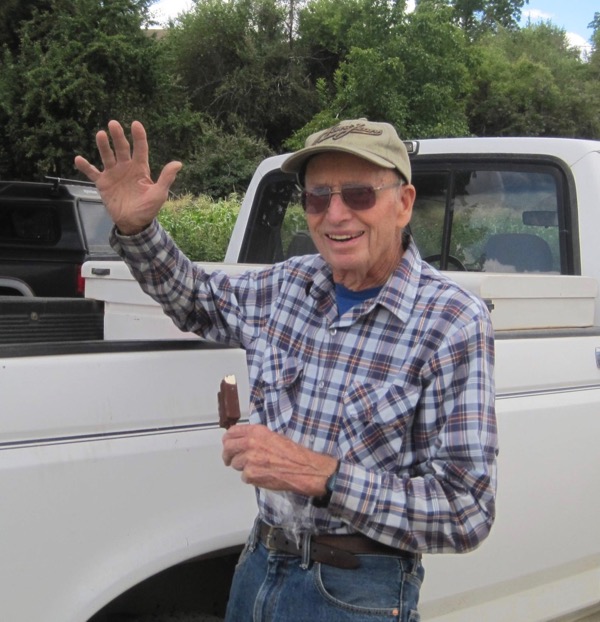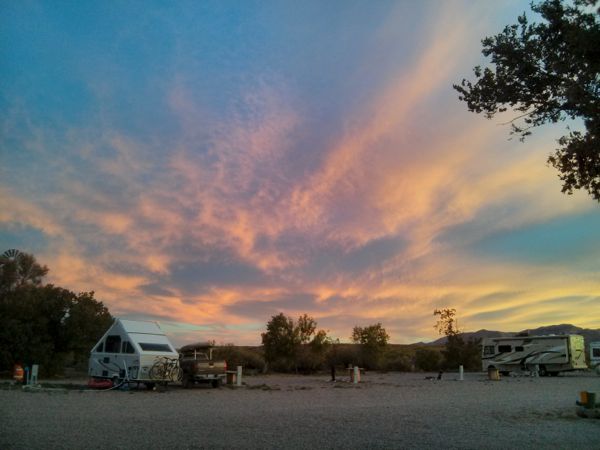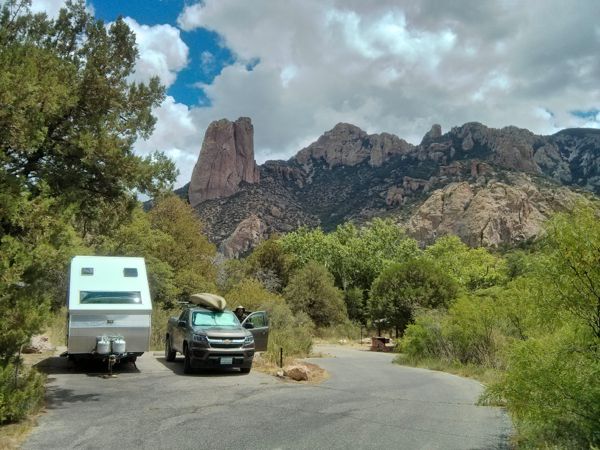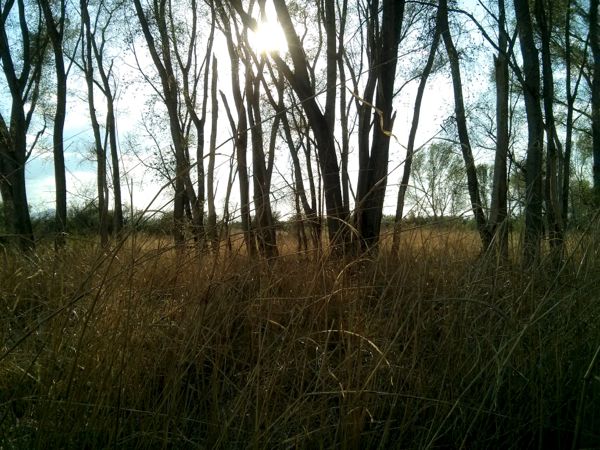Part 2: The Dig
 January 8, 2019
January 8, 2019 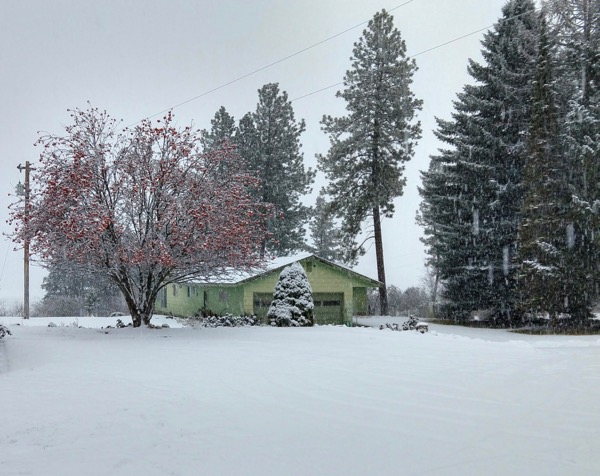
When Mom died nearly four years ago, Dad didn’t move any of her belongings. Her shoes stayed next to the door, her pillbox on the table, her clothes by the dryer. He just went on living around them while his life piled on top. So with his death, one of our first tasks was to clear out their home, which meant going through both of their things at once.
My parents have lived in this house for 50 years—my brothers and sister moved here as teenagers, but this is my only childhood home. After so many years of stasis, the house and its contents felt like a tightly compressed ball of energy. When Dad died, it was like a fuse was lit, and all that energy exploded immediately in all directions. Keepsakes went out the door with children and grandchildren. Bags and bags went to thrift stores and recycling. But the majority was ready to be released as heat and light, and we filled an entire farm truck (twice) with things to be burned in Spokane’s waste incinerator. There was something so right about all that accumulated history and memory being turned into electricity, about clearing the house of the old to make way for the new.
As we cleaned, it struck us that we were conducting an archaeological dig. The top layer was composed of the remains of Dad’s last years alone since Mom died. This layer was mostly things that were clearly disposable: junk mail, old birthday cards, broken sprinkler heads, grocery lists, medication fact sheets, dried up pens and paper clips and popsicle sticks, and all the other little odds and ends that accumulate from daily living. In the parts of the house that he didn’t visit much, this layer consisted of a thick coating of dust.
Below that were the remains from Mom’s last couple years of illness before her death—foot braces, medical bills, memory books from the nursing home, pill bottles, well-worn clothes with her name written on the collars in permanent ink. And below that was a poignant layer of disorganization before we recognized that Mom’s mind was deteriorating. Books on the floor next to the bookshelf. Emails printed out but not filed. Unanswered letters and half-finished projects. I find in a wastebasket a particularly painful note marking the exact edge when Mom suddenly went from her capable self to no longer being able to write an email or care for herself. The note mentions an upcoming concert, then reads: “My condition is deteriorating noticeably. Katie is coming to go to the appointment with the neurologist with me.” This is her rehearsal for one of the last emails she wrote. And this is the only piece of paper in her garbage can. Before that she emptied her can regularly; after that she never used it.
*******
When we skim all this recent history off the top, run the vacuum, and dust everywhere, suddenly the house that I remember when Mom was around is there underneath, still intact after all these years—the same tablecloth, the same memorabilia on the mantelpiece, the same piano music and books and pictures. It is a shock to realize how much the house had changed slowly into “Dad’s house” and to find this familiar place below.
Then we dig even deeper, past the recent history into closets and drawers where we unearth each of our childhoods. First mine—as I was the last to live there—in the puzzles and projects in the dining room cupboards. A replica of a saber-toothed tiger skull that I was chipping out of plaster. Colored plastic strands for braided bracelets. A pelican half-carved out of a bar of soap. Magazine pictures pasted onto scraps of plywood. Bits of lichen and seeds and dried flowers and shells.
Then the life of my siblings appears. In the filing cabinets there are folders for each child of their artwork, grades, school pictures, hospital records for tonsillectomies, and a packet a memorabilia from each birth. There are music lessons, the Learn to Draw with John Gnagy art set that they all drew from together, electronics kits and science fair projects, a row of my sister’s tennis trophies, window sills full of my brother’s pottery from a class he took in college, a quilt that my brother and sister-in-law made that is so well-worn from years of use that Mom had given up patching it. And for all of us, skis and ice skates. Pull toys and blocks. Caroms and Monopoly and Space Shot and Pit. Giant ancient flannel sleeping bags and army surplus camping gear. And the yarn and patterns from all the sweaters and blankets and socks that Mom knitted over the years for children and grandchildren.
Below that we find their life before children. Letters and photos from graduate school. A collection of scientific papers from the lab where my mother worked while Dad was studying physics. A box of unused wedding gifts. Photos of college ski trips. Biology notes, textbooks. Then younger still—4-H ribbons, a red metal horse, a monkey that climbed a stick when you shook it, a little Japanese box with a secret drawer, a tiny candle stub, some “Willkie for president” pins, a pair of steer horns, an old bell with a strap small enough that it must have gone on a lamb.
We dig and sort, clean and cry, share memories and frustrations, and haul box after box out of the house. The sheer volume of information is overwhelming. I feel dizzy with it all, as though I am living in a house of mirrors and I can’t find the passage out. I am not even sure who I am grieving for anymore. Who just died? Is it Dad? Mom? The house? My childhood?
But as we uncover hidden stashes, sort closets and drawers—as room after room slowly empties, I feel like the house is breathing a sigh of relief. It is coming into the present. Soon it will be a place where the current farm owners can live and work. And at the same time, my ideas about my parents are coming into the present as well. My picture of my parents as people is filling in. Now that they are gone I can see in the reflection of their belongings more of who they actually were, rather than just my ideas about them. It’s so clear in this dig through the past that they lived for forty years before I showed up, and that all of my experience with them—all those events that are so fraught with significance to me—are just one small part of who they were. And if this is true of them as people, how much more true it is of them as souls, whatever that connection is to the vast fabric of the universe.
*******
After two whirlwind weeks, I fly back to our trailer in Arizona. Two weeks of very little sleep left me physically tired, but more than that, I felt profoundly unmotivated. A good part of my energy still seemed caught back at the farm, 1500 miles away. Though I felt a sense of freedom in the first days after Dad passed, I didn’t have any plan for moving forward. No longer do I have to wonder whether I will be needed to care for him. No longer do I have to hope he won’t break a bone or wreck the car or burn the house down. And yet all I wanted to do was curl up around my memories and hide.
It has taken me a few weeks to get my feet back under me. It’s like I have been whirled in a blender and my ideas of who I am have been tossed around and broken apart. It is not an entirely unpleasant feeling, but I am still waiting for the present to coalesce again—waiting for the new reality to feel real.
